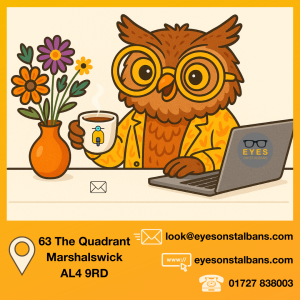We’re not afraid of an open conversation here at EYES on ST Albans. Take this as Let’s be honest – there’s a lot to deal with during peri-menopause and menopause. Hot flushes, brain fog, mood swings and possibly a load of other unexpected symptoms… and now, we’re here to tell you that your eyes might want to get in on the action too.
We know – it’s hardly fair. But changes in hormones during this transition can affect your eyes just as much as the rest of your body. So, if things are looking a bit blurry, stingy, or just not quite right, it might not be your imagination – and you’re certainly not alone.
At EYES on St Albans, we’re here to help you navigate the changes with clarity (both literal and metaphorical). Grab a brew and we’ll explain how.
The Hormone-Eye Connection
Oestrogen and progesterone don’t just hang out in the reproductive system – they influence everything from your skin to your tear glands. During peri-menopause (which can begin in your 40s) and menopause itself, fluctuating hormone levels can change the quality and quantity of your tears, the flexibility of your cornea, and even your vision prescription.
Deep joy.
Common Eye Changes During Menopause
1. Dry Eye Syndrome
One of the most common complaints we see. You might notice your eyes feel gritty, watery (oddly enough), sore, or like you constantly want to rub them. This is because lower oestrogen levels affect your tear production – especially the oily layer that stops your tears evaporating too quickly. It’s not your contact lenses suddenly misbehaving – it’s your hormones again.
2. Blurry Vision
Your prescription might shift slightly, especially during peri-menopause when hormone levels bounce around like a teenager on an energy drink. If you feel like you’re suddenly stretching your arm further to read a book or squinting more at the laptop, it’s worth getting your eyes tested.
3. Light Sensitivity
Changes in tear film and corneal structure can make your eyes more sensitive to light. If you’re suddenly avoiding bright rooms or squinting even when it’s not that bright, it might not just be a you thing. It could be your eyes asking for help.
4. Increased Risk of Eye Conditions
Long-term, post-menopausal women are at increased risk of certain eye conditions such as glaucoma and macular degeneration. That doesn’t mean it will happen – but it does mean regular eye tests become even more important.
What Can You Do?
Start with an Eye Test
Yes, we’re biased – but regular eye examinations really are essential. We don’t just look at how clearly you can see – we assess the health of your entire eye, and can spot early signs of dryness, inflammation, or underlying conditions before they cause problems.
Try Artificial Tears or Eye Drops
Over-the-counter drops can make a big difference. Just be sure to choose preservative-free ones if you’re using them frequently. Or better yet – pop in and we’ll advise what’s best for your specific symptoms.
Invest in Proper Eyewear
We can recommend lenses with anti-glare coatings or blue light filters – particularly helpful if screen time is making your eyes feel worse. (And let’s be real: screen time is unavoidable these days, whatever you do.)
Stay Hydrated and Nourished
Omega-3 fatty acids, plenty of water, and a balanced diet can support your eye health from the inside out. (Chocolate still counts, right? Asking for a friend.)
You’re Not Imagining It – And You’re Not Alone
The peri-menopause and menopause aren’t just about hot flushes and night sweats – they can affect your eyes in ways most people don’t expect. But here’s the good news: you don’t have to suffer in silence or assume it’s just part of the process.
At EYES on St Albans, we understand the changes your eyes are going through – and we’re here to support you with expert advice, gentle solutions, and a friendly face (plus easy access to Fade to Black!).
So if your eyes are feeling not quite themselves lately, book in with us. Let’s make sure you’re seeing the world as clearly and comfortably as possible – whatever stage of life you’re in.



 EYES on seeing the difference
EYES on seeing the difference
Leave a Reply